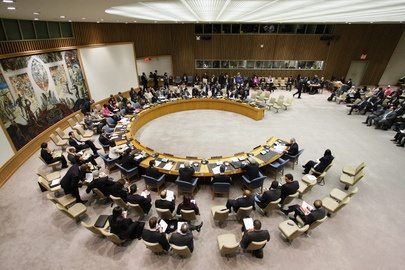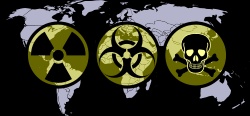

1540 Committee was established to address concerns that non-state actors might use weapons of mass destruction for terrorist purposes. Certainly a realistic and valid threat to address at international as well as individual state level. While one of the more anonymous, it is nonetheless becoming one of the more important in the work of the UN Security Council. The name arises from the conceit of bureaucracy – as the Committee was established pursuant to UN Security Council Resolution 1540 in 2004. Actually, the work of the Committee is now technically founded upon Resolution 1810 adopted in 2008, which extended the previous mandate. (Diplomacy is also aware of pedigree, and, as with people, the longer the bloodlines that can be exhibited, the more standing is assumed – thus the Committee still goes by the designation 1540, although we could technically refer to it as “1540 Junior,” satisfying both the traditionalists and those who are wed to precision).
The Committee’s mandate is coming up for another review and presumed extension by April 25, 2011. Thus, the Council is already in deep discussion on the matter behind the scenes. Presumably a new resolution will be adopted. (I trust though that they will try to do everything to avoid the number of the new Resolution being “1984.” - the UN Security Council is up to Resolution 1976 (Somalia) as of the authoring of this article/blog).
Timely & Mandate Filling Real Considerations?
Actually, I’m not particularly cynical regarding the work of the “1540 Committee.” While I get a bit nervous about overreaching “laws” with vague labels it is nonetheless better than when in form of acts with more presumptuous titles that are meant to cause one to bow before looking into the legislation’s eyes – such as the “Patriot Act.” There are valid reasons for adoption of Resolution 1540 (1810) and further implementation which Security Council Report (the independent reporter on the Council’s work – securitycouncilreport.org) defines in following terms: Resolution 1540 requires that all states:
• prevent non-state actors from obtaining access to nuclear, chemical or biological weapons and their delivery systems;
• adopt laws prohibiting access by non-state actors to such weapons and their means of delivery; and
• establish domestic controls to prevent proliferation of such weapons and their delivery systems, as well as controls over related materials.”
Healthy Reservations?
Security Council Reports also notes the reserve of some toward the work of the 1540 Committee:
“There were initially questions whether the resolution would be widely accepted by member states. However, in recent years the response has improved and is now generally good in part due to the committee's adoption of a cooperative approach in its engagement with states and its attempts to facilitate assistance to states to aid in implementing the resolution.
The Council decided in 2008 in resolution 1810 to extend the mandate of the 1540 Committee until 25 April 2011. The committee has since compiled matrices on actions states have taken to implement the resolution. Through outreach, dialogue and other assistance, the committee also works to provide practical assistance to states to promote implementation of resolution 1540, including the development of domestic legal and infrastructure controls to fulfil these obligations.”
Transparency
What actually makes me less concerned regarding abuse is that the Head of the Committee changes on basis of UN Security Council membership (presumably non-permanent elected to 2 year terms). For example, until the end of this year, the Ambassador of Mexico Claude Heller was Chair. As Mexico’s term expired, the Ambassador of South Africa Baso Sangqu was accorded the role by the Council. This provides comfort that there will not be long, embedded terms with even more rooted agendas working with the authority of the most powerful international institutional body but out of sight.
There are reasons to be considerate of transparency, not so much due to the current work of the 1540 Committee then for what it may evolve or morph into. The only insight of the work of the 1540 Committee is that of information that members may choose at their own discretion to provide and through work of such media and NGOs as the Security Council Report, (who nonetheless have no statutory right to access). The Committee’s work is neither subject to legislative or judicial review.
Ambassador Heller has left behind a set of proposals to be considered. They are also included below as described by Security Council Report. As a whole, they show an evolution, particularly as it relates to functionality in the perceived primary objective – countering terrorism. All good, but I would also propose that such a Committee needs to also understand part of its obligation to be transparency. (So far, the biggest contribution to transparency would appear to be regular reports – particularly renewals of the mandate of the 1540 Committee by the Council). Further, if presumed authority and mandate is to grow then potential abuses by not only UN related institutions but member states acting under the cover of presumed UN Security Council authority. The gray areas that bureaucracy inevitably evolves to exploit under whatever seemingly valid or noble agenda can metastasize into something significantly more usurpive or even dangerous.
By Ambassador Muhamed Sacirbey
Face Book at “Diplomatically Incorrect”
Twitter - DiplomaticallyX
FROM SECURITY COUNCIL REPORT – April 2011 agenda (at
www.securitycouncilreport.org)
Heller briefly highlighted five "ideas and proposals" for the future, both during the joint counterterrorism briefing as well as the 20 December 2010 briefing to the Council by subsidiary body outgoing chairmen. Heller said the proposals which had emerged from bilateral and multilateral consultations were:
• that the committee focus greater attention on biological weapons as the category of weapons of mass destruction with the least number of preventive measures in place (other areas worthy of special attention included delivery vehicles, sanctions lists and the financing of prohibited proliferation activities);
• that the committee enhance cooperation with international entities (such as the International Atomic Energy Agency, the Organisation for the Prohibition of Chemical Weapons and the World Customs Organization), particularly with regard to information exchange, while maintaining respect for the specific mandates of those entities;
• that the committee strengthen its work on cooperation and assistance, as implementation of resolution 1540 depends not only on political will, but also on the resources required for specific security measures;
• that the committee or Secretary-General appoint a coordinator for the committee's group of experts in order to permit it to function more effectively; and
• that the committee's mandate be extended for a longer period, for example by ten years with a review in five years. (Heller pointed out that such a longer mandate would result in a review cycle that is similar to the one for the Treaty on the Non-Proliferation of Nuclear Weapons.)
On 26 January Ambassador Baso Sangqu of South Africa, who began chairing the 1540 Committee in 2011, informed the Council that the committee had decided to extend its 2010 programme of work to cover the period from 1 February to 25 April 2011 (the mandated report on compliance with resolution 1540 that is due in April was added to this existing programme of work).



